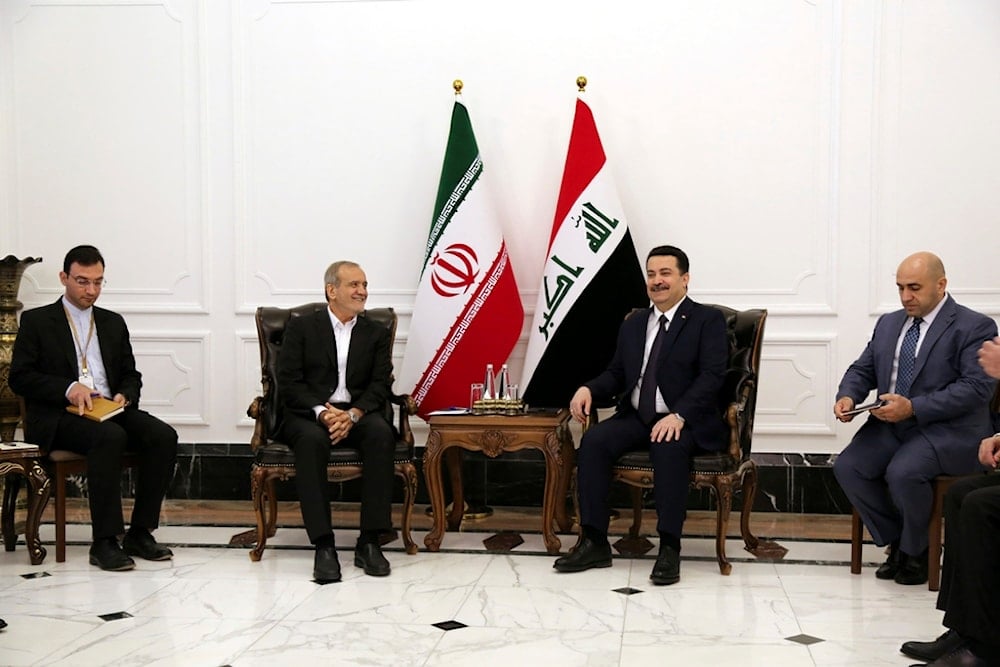Pezeshkian stresses importance of ties with Iraq during state visit
Iranian President Masoud Pezeshkian chose Iraq as his destination for a first state visit, signaling the country's importance for Tehran.
-

Iranian President Masoud Pezeshkian, center left, and Iraqi Prime Minister Mohammed Shia al-Sudani, center right, meet at the government palace in Baghdad, Iraq, Wednesday, September 11, 2024. (AP)
Iraq welcomed on Wednesday Iran's new president, Masoud Pezeshkian, in his first official state visit. The trip is expected to solidify relations and lead to the signing of multiple bilateral agreements.
Enhancement of ties
Iraqi President Abdul Latif Jamal Rashid greeted President Pezeshkian and his delegation at Baghdad's palace, congratulating him on his election and extended condolences for the tragic deaths of Iran's former president, Ebrahim Raisi, and Foreign Minister Hossein Amir-Abdollahian.
President Rashid highlighted the historical ties between the two nations, noting Iran's pivotal regional role in promoting stability and security. He underscored Iraq's strong commitment to enhancing cooperation, particularly in combating terrorism and extremism, and emphasized the importance of finalizing water-sharing agreements.
The Iraqi president also condemned the recent attack on Iran, which resulted in the martyrdom of several key figures, including Hamas Political Bureau leader Ismail Haniyeh. Rashid reaffirmed Iraq's steadfast support for the Palestinian cause and the legitimate rights of the Palestinian people.
President Pezeshkian expressed gratitude for Iraq's warm reception, stressing Iran's commitment to strengthening relations in all sectors. He proposed establishing a joint committee to develop strategic cooperation across multiple areas, including health, industry, security, and tourism, with a special focus on the Kurdistan region.
Iraq's Prime Minister Mohammed Shia al-Sudani also hosted President Pezeshkian, where they discussed regional security and economic challenges. Prime Minister al-Sudani emphasized the importance of joint efforts to address these issues, recalling the legacy of former Iranian President Raisi's support for Iraq.
Pezeshkian presented al-Sudani with a letter from Iranian Leader Sayyed Ali Khamenei, thanking Iraq for its efforts during the Arbaeen pilgrimage, which Pezeshkian called a testament to Islamic hospitality.
14 MoUs signed
The visit culminated in the signing of 14 memoranda of understanding between Iraq and Iran in various fields, including cooperation in training, youth, and sports, cultural, artistic, and archaeological exchanges, education, a joint agreement for media cooperation, telecommunications, organizing religious tourism groups, free trade zones, agriculture and natural resources, postal services, social protection, vocational and technical training, the development of skilled labor, and joint chamber of commerce activities.
Both leaders reaffirmed their commitment to advancing economic cooperation, with a focus on railway logistics between Basra and Shalamcheh to improve transportation links.
They also expressed shared concerns over the ongoing genocide in Gaza, condemning the Israeli occupation's actions and calling for international intervention to halt the violence.
Iranian President Masoud Pezeshkian arrived early Wednesday at Iraq's Baghdad International Airport for his first state visit since assuming office in late July, kicking off a significant three-day visit to the neighboring Arab country.
In addition to his official engagements in Iraq, the Iranian president will visit the holy cities of Najaf and Karbala, where he will pay respects at the shrines of Imam Ali and Imam Hussein, revered figures in Islam.
President Pezeshkian's itinerary also includes a trip to Basra in southwestern Iraq, where he will inspect projects being carried out by Iranian companies. He will then travel to northern Iraq's Kurdistan region, visiting its capital Erbil, and the city of Sulaymaniyah at the invitation of regional officials.
Highly important visit
Amid Pezeshkian’s visit to Iraq, Ali Akbar Velayati, advisor to the Leader of the Islamic Revolution for International Affairs, discussed the significance of the visit in an interview with Al Mayadeen Net.
Velayati told Al Mayadeen Net, "The first visit of our country's president being to Iraq holds special significance, as Iraq is a country of high status for us. The Iranian and Iraqi peoples have a deep historical relationship dating back to the beginning of Islam and even before. There were no issues between them except during the Baathist regime, which was imposed by the United States and its reactionary agents in the region."
To better explain, the advisor cited the ease of travel and the close ties between the citizens of both countries, such as the Arbaeen pilgrimage and visits of Iraqi citizens to Iran. Moreover, religious seminaries in both countries play a crucial role in religious cohesion.
Velayati remembered historical positions that brought together the two people such as during the British occupation of Iraq. At the time, the late Mohammad Taqi Shirazi, known as Mirza II, issued a fatwa in the defense of Iraq against the British. Iranians and Iraqis fought side by side against them.
Similarly, when the Soviet Union occupied northern Iran in 1950, the late Akhund Khorasani in Iraq issued a fatwa against the occupiers, and the tribes of the Tigris and Euphrates region took up arms to defend Iran.
Velayati added that both Iran and Iraq experienced revolutions in modern times: one led by Imam Khomeini and the other by Ayatollah Mohammad Baqir al-Sadr and Ayatollah Hakim.

 5 Min Read
5 Min Read








